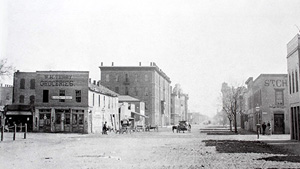From Proud Heritage, Volume I by DCPA, currently out of print.
Francois Santerre was born near Blois, France, in 1809, an only son and a descendant of an old French family. Scholarly in nature, he was well educated and mostly interested in scientific agriculture. As a young man he served in the French Army and after his discharge married Marie Launey. While residing in France, they had six children – two daughters, Ceasarine and Lucie, and four sons, Appollinaire, Germaine, Emanuel, and Raphael.
Discouraged with French politics, Francois Santerre decided to take his entire family to La Reunion, a colony in Texas, U.S.A. Along with other colonists leaving at that time, they embarked on two small sailing vessels on a trip that took sixty days. Expecting to be met in Houston, they were disappointed to find no guide or arrangements. In spite of his lack of knowledge of English, Francois Santerre took charge of the group. He managed to hire teamsters at three cents a pound for the transport of their goods-an exorbitant rate at the time. When the thrifty Frenchman found out that the teamsters intended to charge even more for passengers, they decided to walk.
According to Considerant’s book Au Texas everything in Texas was good to eat, weather was perfect, and vegetables grew to gigantic size with tomatoes as big as watermelons. Consequently, the teamsters had a difficult time explaining to Francois that he couldn’t eat the buzzard he had shot for supper. Another time he brought back a black and white “kitty” for the children; no explanation was needed though they had to move the camp several miles further on, leaving his clothes buried.
When the spring rains set in, traveling became even more difficult. One night all their wooden shoes floated away, causing several days of delay while they searched for them. The trip took all of April and May, but at last they reached the colony where Francois was placed in charge of the development of agriculture.
The farming efforts were discouraging since the colonists, consisting almost entirely of professionals and artisans, found their land was unsuitable for farming. Francois Santerre’s first corn crop averaged one bushel to the acre. The implements were so few that the crops were harvested with swords that their fathers had worn at Waterloo.
After the colony dissolved, Francois Santerre moved his family to a large tract of land at what is now the intersection of Colorado Boulevard and Westmoreland in Dallas. He died in 1889 and his wife, in 1892; both are buried in the old French Colony Cemetery. The large collection of books he brought with him from France were donated to the Sorbonne in Paris and to our Hall of State.
All his children married colonists or sons and daughters of colonists with the exception of Appollinaire, who died in his teens. Ceasarine married Emil Remond; Lucie married Charles Voirin; Germaine married Marie Guyot; Raphael married Ernestine Priot; and Gustave, the first born in the colony, married Rosina Loupot.
My parents were George Santerre and Adelle Huevelle Santerre, both born in Dallas and buried here. My father wrote, The White Cliffs of Dallas – The Story of La Reunion. For my Master’s Degree, I translated Dr. S. Vardan’s Shipwreck in Texas, and wrote a history of the colony.
By Eloise Santerre, Dallas


